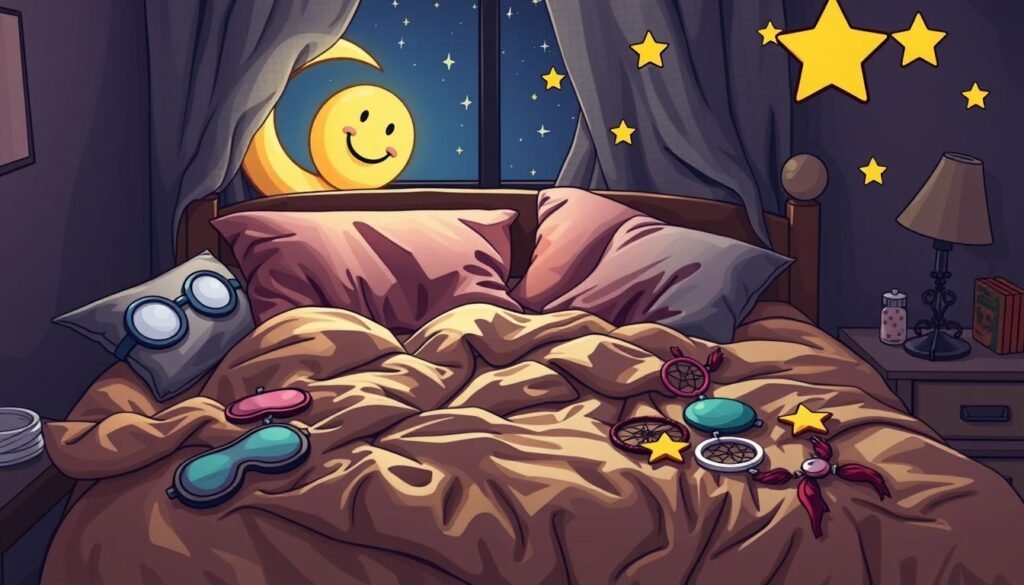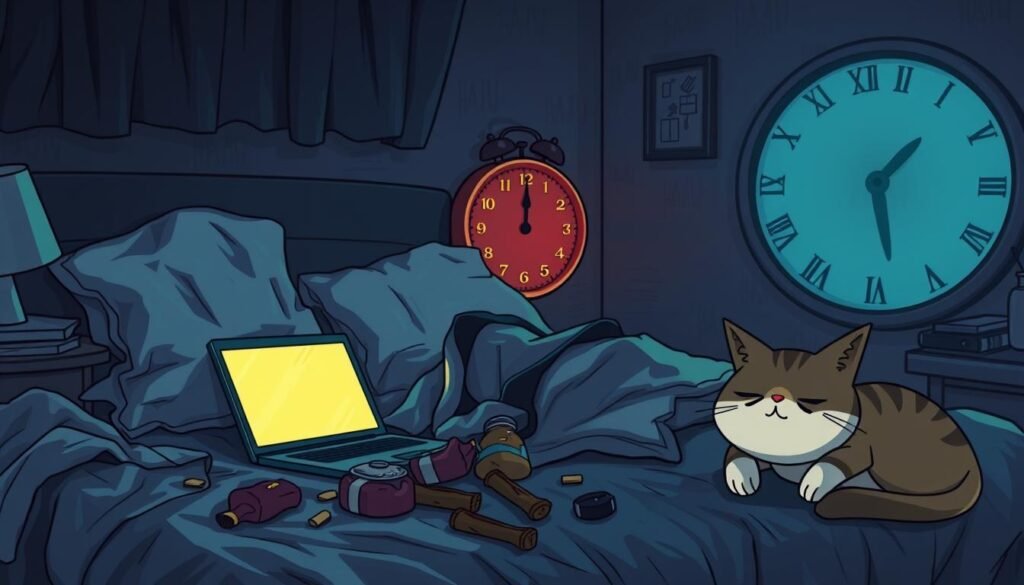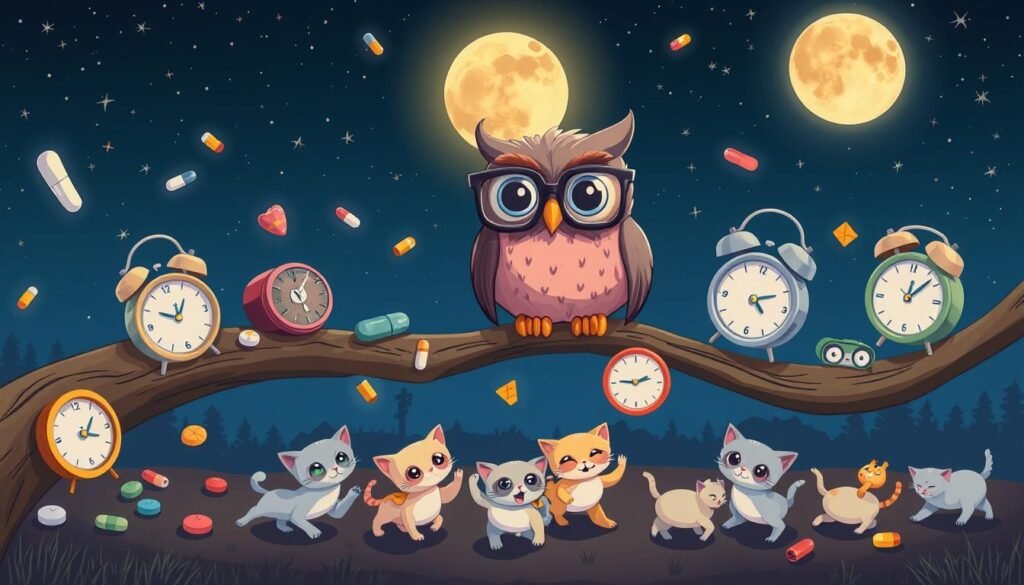About 25 percent of adults in the United States face insomnia. This high number highlights a big problem for many. Insomnia memes are becoming popular. They turn sleepless nights into something we can all laugh about.
These funny images make dealing with sleep deprivation easier. We can all relate to them, especially when stress is high. Memes offer a way to deal with this stress by sharing a laugh.
For anyone dealing with nighttime worries, memes feel like friends who get it. They show our own experiences in a funny way. This helps us manage stress by making light of a tough situation.
Here, we’ll look into why people can’t sleep, its effects on life, and how jokes help. Humor can calm our fears about not getting enough rest.
Key Takeaways
- About 40 million adults in the U.S. experience anxiety disorders, many with sleep disturbances.
- Insomnia memes have grown popular on social media as a coping mechanism for sleeplessness.
- More than a third of American adults struggle to get enough good quality sleep.
- Humor in memes offers validation and connection for those facing insomnia and anxiety.
- Strategies for managing insomnia include sleep hygiene practices and cognitive behavioral techniques.
- Insomnia is especially prevalent during high-stress times like starting a new job or school year.
- While memes are helpful, they should complement other forms of emotional support.
Understanding Insomnia and Its Impact
Insomnia is a widespread sleep issue many people deal with. It makes falling asleep or staying asleep difficult. This leads to sleep loss, daytime tiredness, and irritability. Poor sleep affects focus and emotional balance, increasing anxiety.
At night, anxiety can make it hard to calm down and sleep comfortably. Some try to relax by binge-watching TV, which can worsen sleep quality. Many hit the snooze button repeatedly, trying to prolong sleep as much as possible.
But, there’s a lighter side with the use of internet memes. Memes offer a way to laugh about insomnia together. Platforms like Facebook, Twitter, and Instagram are filled with these humorous shares. This builds a community that understands the struggle of sleepless nights.
For more serious support, apps like BetterSleep and Aura Health App help. They provide meditation and sleep aids for stress management. Laughing is good too. It releases endorphins, making it easier to relax and handle insomnia.
What is Insomnia?
Insomnia is more than just having trouble sleeping now and then. It’s a long-term problem that makes restful sleep hard. About 1 in 10 people who use marijuana may get addicted. This can lead to insomnia and other sleep problems. Many people with insomnia have racing thoughts and a lot of anxiety. This can start a cycle of tiredness and more health problems.
Sleep is as important as diet and exercise for our health. Insomnia can lead to serious issues like diabetes and heart disease. There are two main kinds of insomnia. Primary insomnia comes from stress or life changes. Secondary insomnia is caused by other health conditions, like anxiety or sleep apnea. Knowing the difference helps treat insomnia better.
It’s key to know the symptoms of insomnia. People with insomnia often feel:
- Frustration and anxiety
- Depression
- Trouble focusing
- Headaches and muscle pain
Having a bedtime routine is very important to fight insomnia. Regular exercise helps reduce cravings and improve sleep. Eating healthy foods supports good sleep. Also, avoid using phones or computers before bed to sleep better.
| Type of Insomnia | Causes | Duration | Associated Symptoms |
|---|---|---|---|
| Primary Insomnia | Stress, lifestyle changes | Days to weeks | Racing thoughts, anxiety |
| Secondary Insomnia | Health conditions (anxiety disorders, depression) | More than a month | Frustration, physical symptoms |
Learning about insomnia and using tools like humor helps people deal with it better.
How Does Insomnia Affect Daily Life?
Insomnia causes a lot of sleep loss. This affects many parts of daily life. Simple tasks seem much harder. People often feel irritable as lack of sleep clouds their thinking. This can hurt how well they do their job or maintain personal ties.
Not getting enough sleep can lead to anxiety. Studies show 24% to 36% of people with insomnia also have anxiety disorders. Conditions like generalized anxiety disorder and PTSD share symptoms with insomnia. This makes everyday challenges and long-term health even harder.
The brain needs different types of sleep to stay healthy. These are NREM and REM sleep. Chemicals in our brain affect how well we sleep. Knowing how these systems work shows why sleep is key to a balanced life.
Many adults have trouble sleeping. About 33-50% of adults have symptoms of insomnia. Using phones or tablets before bed can make sleep worse. It’s important to find ways to handle these sleep challenges.
| Aspect of Daily Life | Effect of Insomnia |
|---|---|
| Mood | Increased irritability and emotional instability |
| Cognitive Function | Diminished concentration and memory |
| Relationships | Strained interactions due to irritability |
| Work Performance | Reduced productivity and decision-making skills |
| Overall Health | Increased risk of anxiety disorders and other health issues |
Knowing how sleep loss affects us can help find solutions. This can improve daily life and overall health.
The Power of Humor in Coping with Insomnia
Insomnia often comes hand in hand with stress. This leads to anxiety and feeling tense all the time. Using humor is a great way to fight these feelings. A good laugh sends out endorphins. These make us relax and feel happy.
Memes are pretty important here. They’re not just funny, but also make us feel less alone with our sleepless nights. They show us that others understand what we’re going through. This helps us see our problems in a new, lighter way. It’s a big help in stress management.
Research shows that laughing can make the bad effects of stress smaller. For example, people who laugh more feel less scared and sad. For those struggling to sleep, finding ways to laugh can greatly improve how you feel.
As we face insomnia, letting laughter in helps more than we think. Every laugh builds up our strength to face the day. To add more humor to your life, check out articles on mental health memes. Or, find good ways to sleep by reading about stress management strategies.

The Role of Laughter in Stress Relief
Laughter is a powerful way to relieve stress. It helps both your emotions and body. People dealing with insomnia can find laughter helpful. It lets them forget their sleep issues for a moment. Healing becomes easier. Many studies show the benefits of laughter. They prove it’s good for your mental health and overall happiness.
Laughter Yoga is a cool method that combines laughing with yoga breathing. This mix increases oxygen in your body and brain. You get health benefits of laughter without needing jokes. Even fake laughter can make you healthier, like real laughter does.
Laughing lowers stress hormones and boosts endorphins. This makes you feel happy and confident. In work places, it can make people communicate better and do more work. Laughter sessions can be up to twelve hours long. They’re great for health and might also count towards education credits.
Dr. Madan Kataria found Laughter Yoga and saw it helped the mind and body. It makes people more positive, even when facing hard times. Around 40 million adults in the U.S. have anxiety. Many have trouble sleeping too. Adding humor to daily life is very important. You can learn more here.
Social media sites like Instagram and Twitter share funny things about anxiety and insomnia. Here is a list of laughter benefits:
| Benefit | Description |
|---|---|
| Stress Reduction | Laughter lowers stress hormones in the body. |
| Mood Enhancement | Endorphins released during laughter promote a better mood. |
| Social Connection | Humor creates bonds over shared experiences. |
| Physical Health | Laughter improves oxygen intake and circulation. |
| Self-Confidence | Engaging in laughter boosts self-esteem and confidence. |
While humor helps those with anxiety and insomnia, other strategies are also needed. Cognitive behavioral techniques and sleep hygiene can improve management of night anxiety. They help with better sleep. Get more tips here.
How Memes Can Lighten the Mood
Memes have quickly become a key part of how we talk to each other, especially for those who can’t sleep well. This condition messes with daily life, causing tiredness, quick irritation, and trouble focusing. Memes about not being able to sleep help by offering a fun way to share what it feels like.
When you see memes about not getting enough sleep, it feels like you’re not alone. They show situations many of us recognize. Sharing these memes on places like Facebook, Twitter, and Instagram helps us connect with others who understand. This sense of belonging can make us feel better and more supported.
Laughing more can really help lighten the load of not being able to sleep. Laughter cuts down stress and makes us feel happier overall. This is great for those feeling buried by their sleep troubles. Besides memes, there are tools out there to help too. For example, the Aura Health App offers meditation and sleep tips to help you relax and get some rest.

Top Insomnia Memes to Keep You Company
Many people have a hard time falling or staying asleep. Insomnia makes it tough to get good sleep, leaving folks tired and upset. To handle this, people find insomnia memes funny. They show the sleepless nights we all fear.
Sites like Facebook, Twitter, and Instagram are where people share these memes. They make us laugh and feel like we’re part of a group. This relatable humor helps insomniacs feel seen and supported.
Below are some popular insomnia memes. They show how humor can lighten up a serious issue:
- Memes about the never-ending cycle of moving around in bed.
- Funny stories about the weird thoughts that keep you awake at night.
- Clever quotes about being part of “Team No Sleep.”
These memes are more than just funny. They also show the real struggles of many people. Check out this collection of insomnia memes for a laugh during those long, awake nights.
Funny Insomnia Memes for Late Night Giggles
Insomnia often makes us feel frustrated, especially during the long hours of the night. But funny insomnia memes bring in late-night laughs that anyone who can’t sleep will get. These memes highlight the silly side of sleepless nights, helping us laugh together.
These funny memes are great because they brighten the mood. Just a clever caption or funny picture can make us laugh. When we’re tired, these laughs help us relax and feel like we’re part of a group.
- Memes illustrate common sleep struggles.
- They connect individuals through shared experiences.
- Platforms like Facebook, Twitter, and Instagram make it easy to share these comedic gems.
- Online forums provide a space for insomniacs to bond over humor.
Laughing at these memes makes dealing with sleeplessness easier. They act as a natural way to lessen stress and anxiety from insomnia. A good laugh might not cure sleep problems, but it does ease some tension.

| Type of Meme | Description | Emotional Impact |
|---|---|---|
| Relatable Struggles | Memes depicting common insomnia scenarios. | Encourages recognition of shared experiences. |
| Witty Humor | Captions that twist everyday phrases or situations. | Provides laughter and light-heartedness. |
| Visual Gags | Images that exaggerate tiredness or sleeplessness. | Evokes a sense of belonging and camaraderie. |
Causes Insomnia Insomnia Meme
Many Americans struggle with insomnia, affecting up to 40% of people. It often comes from anxiety and poor sleep habits. Memes about insomnia add humor, making it easier for people to share their struggles.
About 5,000 people looked up “insomnia funny” on Pinterest recently. Memes about common sleep problems bring laughter despite the frustration. They show the real issues of sleeplessness, but in a funny way.
- Fatigue and irritability from insomnia impact daily functioning.
- Memes adeptly showcase the relationship between anxiety and disrupted sleep patterns.
- Many memes highlight the difficulty of finding comfortable sleeping positions.
Adding tips for better sleep to these memes can help. Changes in lifestyle and therapy can boost sleep quality. By sharing memes, people create a community where they talk openly about not sleeping well.
Conclusion
About 25% of adults struggle with insomnia. But, this tough experience doesn’t have to be joyless. Using humor, especially memes, can offer a new view. These funny pictures let us laugh together. They help us feel less alone in our sleepless nights.
Before big life changes, like a new job or school year, many lose sleep. Exploring ways to cope with insomnia is key. Humor and memes provide entertainment. They remind us we’re not fighting alone. This light-hearted content helps us feel connected as we deal with sleeplessness.
Embracing these funny takes on insomnia helps many keep a positive attitude. Recognizing sleep’s importance for productivity is one thing. But, finding humor in our struggles with insomnia is also crucial. It helps us manage our sleep issues better.